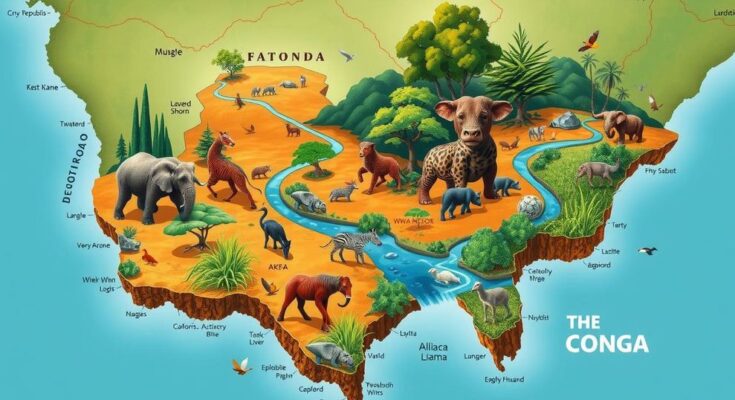The Democratic Republic of Congo is experiencing a severe humanitarian crisis, worsened by political instability and the withdrawal of international support. Talks mediated by Angola between the DRC and M23 have faced setbacks as sanctions against Rwanda complicate the situation. The DRC’s governance issues continue to be exacerbated by changing global diplomatic landscapes, leaving the future uncertain for its citizens.
The humanitarian crisis in the Democratic Republic of Congo (DRC) is worsening significantly, with alarming statistics. By January 2025, prior to the takeover of Goma and Bukavu by the Rwanda-supported M23 militia, less than 13 percent of the 11 million people in need were receiving assistance. The International Rescue Committee has reported a catastrophic decline in health and humanitarian conditions in eastern Congo, causing a rise in cholera due to inadequate sanitation.
Additionally, the Southern African Development Community decided to withdraw its stabilization mission in the DRC, indicating a lack of political will among regional leaders to continue at the cost of additional casualties. The government in Kinshasa is displaying signs of panic and disarray, with fears of a coup as they exhaust their options.
In a surprising development, Angola offered to mediate talks between the DRC government and the M23, a move seen as a potential opportunity for de-escalation. Despite President Tshisekedi’s previous resistance to negotiations, regional pressures and apparent messages from U.S. officials prompted this thaw in approach. However, skepticism remains regarding U.S. involvement due to the chaotic state of the DRC’s political and business environment.
Optimism regarding these dialogues diminished when the M23 retracted its attendance commitment following the imposition of sanctions by the European Union on Rwanda. Meanwhile, Rwandan President Kagame criticized these sanctions as neo-colonial interference and severed diplomatic ties with Belgium to assert his position.
Recent communication between Kagame and Tshisekedi, facilitated by Qatar, produced a renewed commitment to a ceasefire. However, past experiences cast doubt on the sincerity of these commitments, especially given the absence of specific plans for ceasefire monitoring. As Rwanda gauges its strategic ambitions, the DRC government is preoccupied with its own survival amidst these tumultuous events.
The current geopolitical landscape, influenced by leaders such as Vladimir Putin and Donald Trump, appears to prioritize territorial expansion and mineral rights over humanitarian concerns. This shift raises substantial questions about the future governance and humanitarian welfare in the DRC, as neither the prevailing order nor a potential Rwandan-imposed regime suggests a hopeful resolution to the ongoing crisis.
In conclusion, the Democratic Republic of Congo faces an escalating humanitarian disaster amidst complex geopolitical challenges. The disorganized government, shifting diplomatic dynamics, and precarious ceasefire commitments highlight the absence of effective governance solutions. Without a fundamental change in local and international approaches, the DRC’s humanitarian situation is likely to deteriorate further, and the hopes for a sustainable resolution remain dim.
Original Source: www.cfr.org




